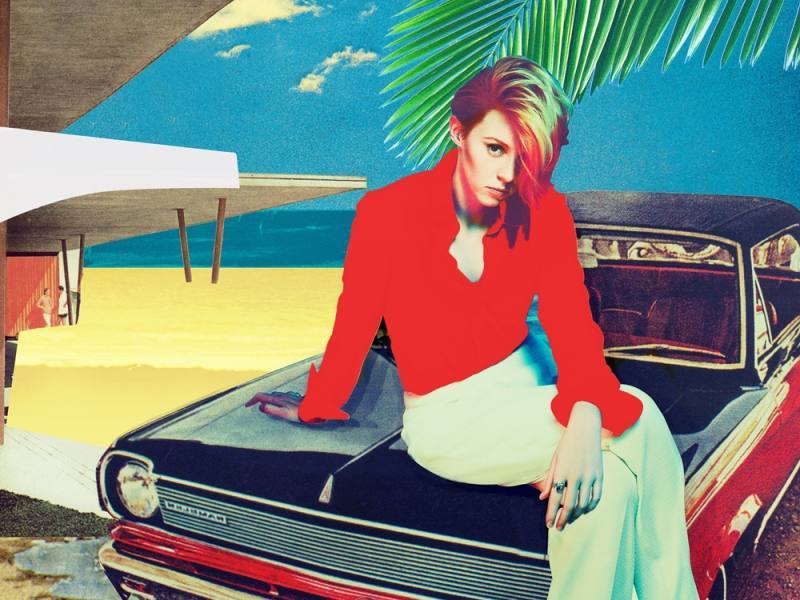La Roux

As soon as she stepped out as La Roux, it all just felt right for Elly Jackson. The shock of red hair. The androgynous image. The yearning yet furious songs about love lost and gained. The catchy pop hooks, all wrapped up in quirky melodies that NME, early on, accurately described as ‘Let’s Dance’ era Bowie crossed with The Knife's edgy electro-pop. It was a perfect pop storm, with her first single ‘In For The Kill’ reaching number two in the UK charts, and the follow-up ‘Bulletproof’ going to number one.
But as with all overnight success, the La Roux sound took time to evolve. Music was always an escape, a way of expressing herself, and Elly started writing songs on guitar when she was 13, influenced by singers her parents played, like Joni Mitchell and Nick Drake. But she didn’t find an identity of her own until she was 17 and discovered clubbing, dancing, and the endless possibilities of electronic music.
It was a sound the world was ready for. In total, La Roux sold more than six million singles worldwide, and over two million copies of her eponymous debut album. And the only person surprised seemed to be Elly herself.
‘I wasn’t prepared for it,’ she laughs. ‘I was 21 and still living with my parents! The record was supposed to be cold and hard and jagged and cheap-sounding, and I just didn’t see it as being particularly commercial.’
The record was released in the US a year later, winning the Grammy for Best Electronic/Dance album in 2011. As a result, Elly ended up touring or promoting for two years virtually non-stop, and afterwards she needed to take some time out to relax, and learn how to take care of herself better. ‘I really enjoyed touring,’ she says. ‘But it happens so fast, it spirals and you don’t have time to process it all. And then it catches up with you.’
So when it came to making the new album, she took her time. ‘I wanted to create something more special, to take myself up a level,’ she says. ‘I also wanted to play pretty much everything as I did on the first record, but there was more complicated instrumentation this time, and it took me a while to get to grips with some of it.’
In the process, Elly realised she was moving in a different direction, creatively, from Ben Langmaid, her collaborator on the first album. They went to write and record in a barn in Devon, but Elly was not happy with the results. Eventually she decided to record the album with its engineer Ian Sherwin taking over production. ‘There was a general concept that Ian and I connected strongly on and discussed at length, which was the idea of what people in the 70s thought the future would look and sound like,’ she says.
‘The new album is different. The music has a warm, kind of sexual energy to it. But it still is intrinsically La Roux. And that comes through in a lot of the parts, the riffs, the hooks I write as well as my voice.
‘We talked a lot about dub while we were making the album, and we used the term “ragga disco” a lot at the beginning, but I doubt anyone could identify that now! Obviously there are disco influences, too.I listened to a lot of Nile Rodgers, as I always have. He came down to the studio one night, to hang out and talk about music, and I ended up performing live with him at the 2012 Montreux Festival, which was unbelievable!But I don’t think it ended up sounding like a disco record either. It’s a weird pop hybrid made out of little hints of other things.’
Trouble In Paradise is inspired by a particular tropical island she has visited since childhood, where she met a character very similar to the one portrayed in the laid-back, almost electro-calypso track ‘Tropical Chancer’. It’s a beautiful place, she says, but also very poor, a place that visitors fall in love with but the locals yearn to escape from.
‘On holiday, I always wonder what the beach is like out of season, when it’s empty, or what the people who are being so nice to you in a restaurant really think of the tourists who come and go. I’ve always been fascinated by what a place is like when you’ve left it, or that point after the party when there’s just balloons on the floor and there’s a weird emptiness in a place where such joy happened. And that became a huge inspiration for the record.’
Trouble In Paradise is all about the darkness lurking behind the most beautiful tune, the doubts in even the happiest of relationships, and trouble in all its forms, whether it’s the riots in Brixton, the part of south London she still calls home(Uptight Downtown); conflict between couples (Cruel Sexuality, Kiss And Not Tell); or cheeky stories like Sexoteque. ‘It’s about a bloke who can’t stop going to sex clubs, inspired by a club I saw when I was on tour in Montreal. I just thought the name was brilliant’.
It’s a less personal album this time round, more mature and ambitious, but also more playful in its subject matter. But though the lyrics are important to Elly, it’s in the music that she tells her real stories.
‘When I listen to the Young Americans album, for instance, I don’t listen to Bowie’s vocal, particularly,’ she says. ‘It’s the music that really gets me, the way the parts play off each other, it’s the syncopation, the playfulness of it. Or in a Tom Tom Club track, where you hear a little noise and it actually makes you laugh because it’s got so much character.
‘That’s why I chose to do slightly extended versions of the tracks. It means I get to explore the music of that song a lot more, I get to do a lot more. This time round, I really wanted to let the music do the talking.’







